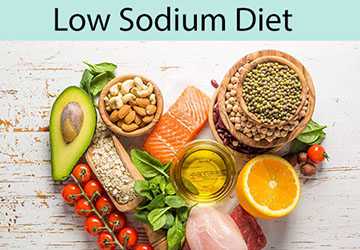Today's diet includes a high amount of sodium and focuses more on being standard than the exception, thanks to highly processed and fast foods.
Excessive sodium consumption is linked to various health issues, yet many individuals remain uninformed about this fact. Thus, reducing your sodium consumption could mean a chance to get well while simultaneously improving your quality of life.

Delve into what makes a low-sodium diet so essential and how a diet low in sodium can do wonders for your body in this blog.
Salt is crucial for maintaining fluid equilibrium and facilitating neural transmission in the body. On the contrary, an excess intake may result in various health conditions.
The body, in fact, only needs a small amount of sodium to facilitate that need, yet most of us take more than required.
This excess can lead to higher blood pressure, increased strain on the heart and kidneys, and cardiovascular diseases, among other health issues.
Check out these compelling arguments for embracing a low-salt lifestyle and potentially reducing sodium intake.
Salt often leads to fluid retention, elevating blood pressure. Reducing dietary sodium intake could help improve hypertension levels. Significant reductions minimize the risk of stroke and heart failure.
Research indicates that substantially decreasing sodium consumption can notably reduce blood pressure in those with and without hypertension.
Excessive sodium consumption significantly contributes to heart problems, including coronary artery disease and cardiac insufficiency.
It helps reduce salt in your diet, reduce cardiovascular complications, and contribute to a longer and healthier life.
High sodium intake in food increases calcium excretion in urine, eventually leading to kidney stones.
A reduced-salt regimen supports optimal renal function and diminishes the likelihood of developing nephrolithiasis.
"Sodium causes fluid retention and, upon consumption, induces the swelling of hands, feet, and ankles."
Low sodium intake can reduce discomfort and restriction related to swelling and fluid retention.
Sodium alleviates the extra burden on your heart caused by hypertension and fluid accumulation. Reducing your intake of sodium will help in reducing a lot of strain.

A reduced-sodium diet benefits the heart by reducing the amount of work demanded; hence, with time, the functionality increases.
Constantly high sodium intake dulls the taste buds to other flavours. Reducing dietary salt can heighten taste sensitivity, allowing you to savour the diverse flavours in food better and enjoy more flavorful, varied meals.
Chronic high sodium intake can exacerbate some of the age-related health issues or even lead to others, such as osteoporosis and dementia, including Alzheimer's disease.
Low-sodium diets minimize such conditions, contributing to bettering healthy ageing, among other conditions; therefore, general longevity is supported.
Moving to a low-sodium diet is more than just putting the salt shaker down. Here are some practical tips to get started on lowering your sodium intake:
● Read Food Labels: Always check the food labels of packaged foods, looking for the amount of sodium, and opt for options with lower sodium content.
● Cook at Home: Home cooking allows you to regulate sodium levels and other ingredients in your dishes.
● Use Herbs and Spices: Season with herbs, spices, vinegar, and lemon juice instead of salt.
● Choose Fresh or Frozen Over Canned: When possible, avoid canned goods. Fresh and frozen fruits and vegetables have much lower sodium and sugar than canned or dried equivalents.
Understanding the many benefits of a low-sodium diet can inspire you to change your eating habits today. Take this as your motivation to embrace a healthier lifestyle.
If you want to try a low-sodium diet, consider visiting your doctor or, better yet, a dietitian. They can help you develop a personalized eating plan suited to your needs.
Share low-sodium recipes to inspire others and spread the word about this beneficial dietary change. Get started now, and take a significant step in the right direction for your health and well-being.